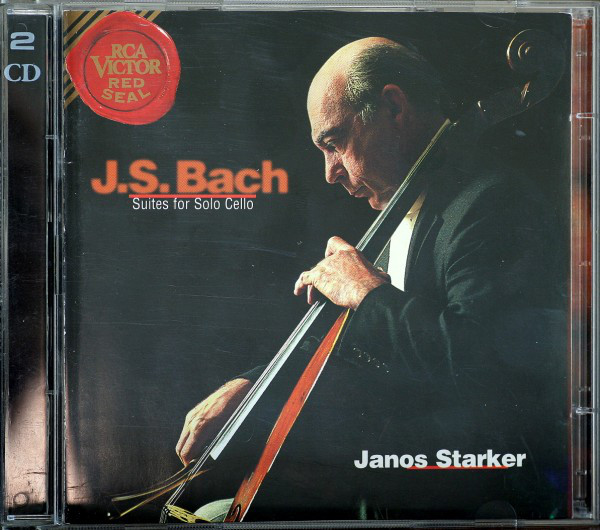
Janos Starker. Bach Cello Suites for Solo Cello (RCA Victor Red Seal 09026-61436-2) Rec.1992
Introduction.
This is Starker’s 5th and final recording of the Bach Cello Suites. It is my second version reviewed since I also own his early 1960’s Mercury set.
The Music.
From the outset of listening it is evident that his final thoughts are quite different to the earlier set. In that one he impressed especially with his technical command and fearless approach. He often comes across as uncompromising and, in a phrase I used then, seeming to be “taming the Suites”.
In contrast, his thoughts in the final version seem to focus more on giving the Suites room to breathe and the listener more time to pay attention to all that is going on. For sure his track timings are mostly significantly longer than before. To be fair, I haven’t checked back as to whether this may partly result from observing less repeats than the current set.
Flowing lines.
Interestingly, Starker does not focus so much this time around on crisp articulation. Nor delineation of individual notes or phrases. Instead, his preference is to let the phrases flow into one another. This results in some lovely flowing lines. He also produces a very appealing deep and resonant sound. This especially in the bass register, by digging deep into the strings. The cello itself may be helping here, and although there are no details attributing the maker of the cello in the booklet, he is known to have owned a Goffriller which may fit the bill.
Starker’s own comments in the booklet are interesting. He starts with “I was often asked why at age 70, I am recording Bach’s Suites for the fifth time”.
This I find intriguing as when recorded he would actually have only been 67 with a birthday to follow a few weeks later! Of more use to us is the statement:
“Playing Bach is a never ending quest for beauty, as well as in some sense, the truth……….As the years go by , the understanding grows while the technical means weaken”….
Poetry.
I think this is a pretty knowing and accurate reflection when comparing this set to his earlier example. The technical side of things may show a little more strain (although not in any way that appreciably diminishes the enjoyment), but Starker is taking more time to find the poetry and other rewards in the pieces.
There are delightful exceptions to this broad approach, most notably the 2nd Gavotte in the 5th Suite. This is a quicksilver reading with a much lightened tone (conjuring images of a slowed down Flight of the Bumble Bee!) but these are rare.
The recording itself is much more forward than in the Mercury set, with microphone placement regularly picking up Starker’s breathing. However, this is not intrusive enough to affect the overall pleasure the set brings. It does also allow the beauty of the cello itself to be appreciated all the more.
Conclusion.
I was surprised to find the set was not released until 5 years after it was recorded. Significantly, upon release it won the 1997 Grammy Award for Best Instrumental Soloist. If the earlier Mercury set is perfect for when one fancies an adrenalin rush, then the final one is perhaps for listening to alone late at night. I would advocate a glass of wine nearby, when both can be slowly savoured. For me both versions are indispensable, but perhaps as my age advances I lean more to Starker’s last thoughts on Bach.
Mark.